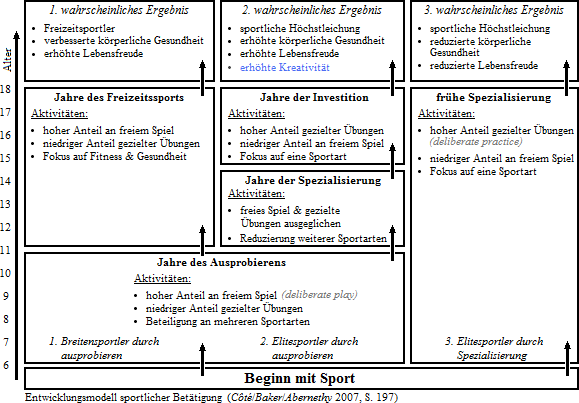 US-Volleyball-Coach John Kessel about words, language, positive thinking and motor learning
US-Volleyball-Coach John Kessel about words, language, positive thinking and motor learning
Here an elder post about Rosenberg’s principles of nonviolent communication and (motorskill)learning.
 US-Volleyball-Coach John Kessel about words, language, positive thinking and motor learning
US-Volleyball-Coach John Kessel about words, language, positive thinking and motor learning
Here an elder post about Rosenberg’s principles of nonviolent communication and (motorskill)learning.
 Training exekutiver Funktionen im Warm-Up mit der Koordinationsleiter:
Training exekutiver Funktionen im Warm-Up mit der Koordinationsleiter:
Coach gibt Bewegungsaufgabe für die Athlet*innen an: z. B. 13×3 in der Koordinationsleiter weiterlesen
„The ability to stop and consider a response, to use the experience of a wrong choice as a guide in making the next decision, relates to executive functions (…). Learning from our mistakes is profoundly important in everyday life, and Hillman’s study shows that exercise – or at least the resulting fitness levels – can have a powerful impact on the fundamental skill.“ (out of Ratey, J. „Spark“, 2008, p 26)
Marco Henseling beschäftigt sich in seinem Beitrag auf www.spielverlagerung.de mit spielorientiertem Training im Nachwuchsbereich des Fußballs. Sein Artikel beschreibt die Bedeutung des spielerischen Lernens anhand der Entwicklung von Kindern und Jugendlichen. In der folgenden Grafik macht er noch einmal deutlich, welche Konsequenzen die frühzeitige Spezialisierung auf eine Sportart für den Athleten haben kann.

This is a link to an interview with Dr. Daniel Memmert, who is a Professor and head of the Institute of Cognitive and Team/Racket Sport Research at the German sport University of Cologne. Published on footblogball.
„An isolated technical training only results in the problem that techniques cannot be related to situations and therefore a tactic cannot be trained. We know from studies that technical training is not as effective as combined technical-perception training and cannot be applied as variable. It is important that children Teaching Tactical Creativity – Dr. Daniel Memmert weiterlesen